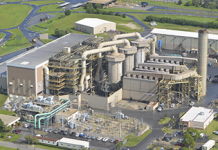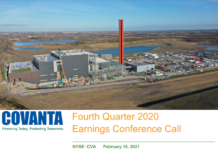Jim Lane
Closely-watched green gasoline producer collapses as Waste Management (WM) declines next financing round.
What does it mean for companies like Fulcrum Bioenergy, Enerkem, Agilyx, Agnion, Renmatix, Genomatica, and InEnTec? The Digest looks at the inside story.
![]() In Texas, Terrabon filed for Chapter 7 bankruptcy protection; the company’s operations will cease and a trustee will be tasked with liquidating the company’s assets for the benefit of creditors.
In Texas, Terrabon filed for Chapter 7 bankruptcy protection; the company’s operations will cease and a trustee will be tasked with liquidating the company’s assets for the benefit of creditors.
The complete Chapter 7 announcement is here.
In a statement, Terrabon’s leadership said that company could not obtain additional corporate funding to finish developing and engineering its first commercial-scale plant. Suspension of operations resulted in lay-offs of approximately 60 full-time employees, effective with the bankruptcy filing.
The storyline is clear enough: Terrabon had a financing round planned for this year, which Waste Management was expected to lead. In August, Terrabon learned that Waste Management would not be participating in the round – part of what Terrabon was informed was a cutback in WM’s overall capital investment following a late July corporate shake-up.
What does Terrabon make?
Terrabon produces high-octane gasoline using its MixAlco technology. MixAlco is an acid fermentation process that converts biomass into organic salts. The resulting non-hazardous organic salts, or bio-crude, would be then shipped by truck, rail or pipeline to a Valero refinery or other centralized processing facility where it would be converted to a high-octane gasoline that can be blended directly into a refiner’s fuel pool, avoiding many of the blending and logistics challenges presented by ethanol.
As of last year, Terrabon had exceeded its goal of producing 70 gallons of renewable gasoline per ton of MSW using its patented acid fermentation technology.
And last fall, Terrabon announced that it has been awarded a $9.6 million, 18-month contract by Logos Technologies to design a more economical and renewable jet fuel production solution for the Defense Advanced Research Projects Agency.
Rumors flying
The announcement capped off a month in which unconfirmed rumors concerning Terrabon’s struggles in its latest financing round increased in frequency and intensity. By Wednesday, the Digest wrote:
“But we expect that we have not seen the last round of rationalization by a major strategic – perhaps not even the last major announcement this month. Watch those companies that have had their strategics on board for three years, or more. It’s hard for strategics to make shifts in less than three years without looking unserious – without the data to make decisions – but three-year time windows are usually enough for portfolio rationalization to occur. Not to mention that effective corporate godfathers often move up or out within three years.”
The WM reorganization
 In the last week of July, Waste Management announced a decision to eliminate 700 positions – 2 percent of its overall workforce – and a flattening of its management structure as well as reductions in corporate support staff.
In the last week of July, Waste Management announced a decision to eliminate 700 positions – 2 percent of its overall workforce – and a flattening of its management structure as well as reductions in corporate support staff.
The plan was announced after WM profits fell to 45 cents per share for Q2 (down from 50 cents in Q2 2011) and well down from consensus analyst expectations, pegged at 53 cents. It was the fifth quarter in a row of falling margins at WM, and a second consecutive quarter of missing analyst expectations.
At the same time, WM maintained its shareholder dividend – putting presumed pressure on capital outlays such as represented by the investing activities of the Organic Growth Group, tasked with finding growth opportunities synergistic with the WM’s objective of maximizing value from waste, including converting them into biofuels, renewable chemicals and energy.
WM’s representative on the Terrabon board, WM Senior Vice President Carl Rush – chief of the company’s organic Growth Group, took early retirement in the corporate restructuring.
Other financing options at Terrabon
Terrabon quietly laid off 40 staff in late August in an attempt to reduce the cash burn and buy more time for refinancing. Other investors in Terrabon were sympathetic, but unable to fill the void on short notice. Valero, for example, had faced a similar situation at Qteros in the past year – while stepping up at Mascoma with increased investment aimed at helping that company proceed to complete its first commercial plant. Last summer, Valero announced that it OK’d the financing of the Diamond Green renewable diesel project off its balance sheet, and pulled out of the DOE loan guarantee program.
A flutter of hope
In the last week of August, hopes grew that Waste Management would be able to continue to support its complete set of planned investments, when WM and Renmatix announced a joint development agreement to explore the feasibility of converting post-consumer waste into affordable, sufficient-quality sugars for manufacturing biobased materials. At the time, it was reported that WM had joined global chemical giant BASF and Kleiner Perkins Caufield & Byers in Renmatix’s Series C raise, now totaling $75M. More on the WM, Renmatix deal is here.
In addition, WM continued to participate in Genomatica, joining the $41.5M Series D round that was announced August 3rd, and which included Alloy Ventures, Draper Fisher Jurvetson, Mohr Davidow Ventures, TPG Biotech, and VantagePoint Capital Partners – with WM as the chief strategic. But Terrabon was unable, ultimately, to secure another round of WM support.
Reaction at Waste Management
On Friday, Waste Management issued the following statement: “Waste Management has invested over several years in a diverse portfolio of conversion technology platforms to determine if they are scalable and economic. With the prospect of converting organic energy into biofuels still in various stages of development, not every initiative in our range of investments is certain to succeed. We will continue to nurture, evaluate and scale up the most viable conversion technologies that match our ongoing strategy of extracting more value from waste.”
The company also confirmed that former McKinsey partner Bill Caesar, who joined WM as chief strategy officer in 2010 and subsequently became president of Waste Recycling Services, had taken over responsibility for the Organic Growth Group, and the company said that OGG “definitely remains a part of our company post-restructure.”
Reaction at Terrabon
“It is with great disappointment we announce Terrabon has been unable to obtain additional financing and must suspend operations,” said Gary Luce, CEO of Terrabon. “This is a sad day for Terrabon’s employees, partners, suppliers and
vendors who never wavered from their robust support of our company and the technology we deeply believe in. We want to thank them and convey how deeply we appreciate their steadfast loyalty during our journey to become an additional source of alternative energy for the United States.”
The company had been aiming for a 5 million gallon small commercial facility by 2013 based on 220 dry tons of feed per day. The copnay had intended to move to 500 ton and 1000 ton per day designs. At 1000 tons per day, they projected $1.00 per gallon operating costs and capital cost per annual gallon is between $6.00 and 8.00. Accounting for the BTU difference between ethanol and gasoline, on an ethanol-equivalent basis that equated to $0.67 per gallon operating cost and $4.00 – $5.33 per annual gallon capital cost.
More on the technology and data here.
Who else is in the WM portfolio?
Besides Terrabon and Renmatix – there are quite a few. Among them: Fulcrum Bioenergy, Enerkem, Agilyx, Agnion, Genomatica, and InEnTec. In the near term, Fulcrum Bioenergy and Enerkem are the closest to fuels commercialization (and the big capital calls).
In the case of Enerkem, they also have parallel investments from Valero and Waste Management (Enerkem Senior VP for Business Development, Tim Cesarek, was until last year the manageing director of the WM’s Organic Growth Group and served for more than a year on the Terrabon board.)
One-off or trend?
We see this as a one-off. WM had a wide range of investments, and though the timing was awful, portfolio rationalization is inevitable for strategics. Terrabon had not have a completed engineering package at commercial-scale – despite being founded in 1995 – and clearly was “a bridge too far” for WM.
Last week, we wrote: “Here’s the problem with big strategic partners for small, early-stage companies – and one of the reasons that, for many years, VC firms didn’t want strategics along for the ride in venture development: strategics change strategy, and small changes at big companies result in big changes for small companies. What is a ripple in the water to a giant is a tsunami to a fly.
“Often, strategy must shift as the result of weak earnings, weak economies, or large-scale acquisitions that come with collateral businesses that must be rationalized, cleaned up, or otherwise fitted under the corporate umbrella. Personnel changes at strategics can have colossal impact on small companies, too. Or just painful rounds of rationalizing investments, after the pleasant couple of years making them.”
The impact on other WM investments?
Too soon to tell. Certainly the company continues to be on a strategic path towards unlocking higher value from waste through advanced technologies that produce fuels and chemicals. With landfill volumes flat (and not helped by a sluggish economy, WM is determined to invest in new markets and higher-value product streams.
We continue to expect WM to take investments on a one-by-one basis – though the patience for long development timelines and the appetite for new technologies may have been reduced by increased capital constraints at WM in the nearer-term.
The bottom line
The company’s assets will be sold by the trustee. Absent a completed engineering package, it will be difficult to easily separate the technology from the laid-off team that had been built up to shepherd it towards commercialization. We’ll wait to see who picks up the Mix-Alco technology – both in terms of Terrabon’s improvements and the technology originally licensed out of Texas A&M. Also, we’ll wait to see the fate of the aforementioned Logos project to design a more economical and renewable jet fuel production solution for the Defense Advanced Research Projects Agency.
Disclosure: None.
Jim Lane is editor and publisher of Biofuels Digest where this article was originally published. Biofuels Digest is the most widely read Biofuels daily read by 14,000+ organizations. Subscribe here.








